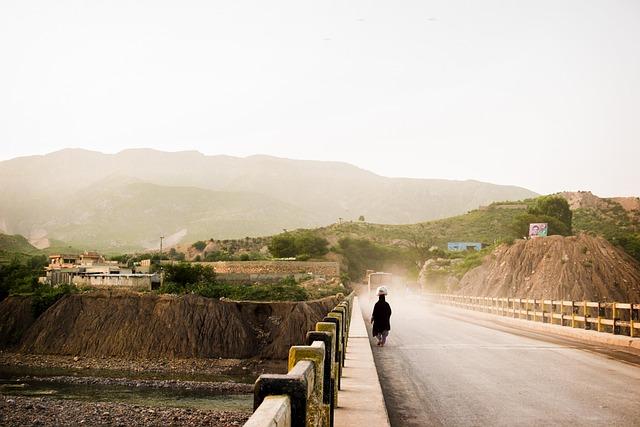In the heart of South Asia, where the Indus River weaves a tapestry of history and culture, Pakistan stands at a crossroads, marked by an intricate dance of hope and challenge in the realm of journalism. As the nation grapples with its complex social fabric, the role of the media becomes more pivotal than ever—acting not just as a mirror reflecting societal issues, but as a beacon guiding the path toward accountability and transparency. However, the landscape of journalism in Pakistan is fraught with trials, from the perils of censorship and intimidation to the ever-present struggle for the truth amidst swirling tides of misinformation. This article embarks on a journey to explore the current state of journalism in Pakistan, delving into the obstacles faced by reporters, the impact of digital evolution, and the resilience embodied by those who strive to uphold the principles of credible journalism in an environment where freedom of expression is continually tested. Join us as we unravel the complexities of this critical sector, illuminating the stories and voices that strive against the odds to keep the flames of informed discourse alive.
Challenges in Press Freedom: Analyzing the Current Landscape
The current state of journalism in Pakistan is a tapestry of resilience and repression, woven together by various influences that shape media operations. Government censorship remains a significant hurdle, where many outlets face restrictions, resulting in self-censorship as journalists often tread cautiously to avoid repercussions. The rising trend of online harassment has also cast a long shadow, stifling voices critical of the establishment. Journalists, especially women and minorities, often find themselves under threat, both digitally and physically, disrupting their ability to report freely. Various political entities manipulate the media landscape, leading to biased coverage that seldom reflects the truth of the situation.
Moreover, economic factors play a critical role in press freedom challenges; many media organizations struggle financially, leading them to prioritize sensationalism over factual journalism. The dependency on advertisement revenue often compromises the integrity of reporting, pushing news outlets towards clickbait strategies that detract from substantive journalism. The emergence of digital media has offered promising avenues for information dissemination; however, it has simultaneously complicated the landscape, with misinformation spreading rapidly. In this intricate environment, the perseverance of passionate journalists is commendable, yet their plight also highlights the urgent need for institutional reforms to bolster press freedom in the country.
The Role of Digital Media: Opportunities and Threats for Journalists
The emergence of digital media has revolutionized the landscape of journalism, offering unprecedented opportunities and challenges for journalists in Pakistan. Platforms such as social media, blogs, and online news outlets empower journalists to reach wider audiences and engage with diverse communities directly. These tools facilitate instantaneous news dissemination, enabling reporters to break stories in real-time and gather instant feedback from readers. Additionally, the reduced cost of publishing online lowers the barriers to entry for aspiring journalists, fostering a more pluralistic media environment. Key benefits include:
- Increased Accessibility: Journalists can report from remote areas, bringing local issues to the forefront.
- Diverse Platforms: Opportunities for multi-format storytelling through text, video, and infographics.
- Audience Engagement: Direct interaction with readers promotes transparency and community involvement.
However, the digital landscape is not without its threats. The rise of misinformation and “fake news” undermines the credibility of journalistic work, creating a climate of distrust among audiences. Journalists must navigate a complex web of online harassment, censorship, and legal challenges that can stifle free expression. Additionally, the pressure to produce content rapidly can compromise quality and ethical standards. The following challenges illustrate the precarious nature of digital journalism:
| Challenge | Description |
|---|---|
| Misinformation | Spread of false information can distort public understanding of current events. |
| Censorship | Government regulations and pressures can limit investigative reporting. |
| Harassment | Journalists face online threats that can impinge on their safety and freedom. |

Promoting Ethical Standards: Strengthening Integrity in Reporting
In the current landscape of journalism in Pakistan, fostering a culture of ethical reporting is paramount to ensure the credibility and integrity of the media. Journalists face numerous challenges, including censorship, harassment, and the pressure to sensationalize stories for higher viewership. To combat these issues, media organizations and practitioners must prioritize adherence to ethical standards that promote accuracy, fairness, and accountability in their work. This involves establishing internal codes of conduct, providing regular training on ethical journalism, and encouraging open dialogue about ethical dilemmas faced in reporting.
Moreover, one effective way to strengthen integrity in journalism is through the establishment of independent monitoring bodies that can oversee and assess media practices. These organizations should aim to ensure that journalistic endeavors remain free from external influences and are guided by the principles of truthfulness and impartiality. Encouraging collaboration among journalists, civil society, and legal experts can also help create a robust support system that addresses ethical breaches and promotes responsible reporting. With collective effort, the journalism landscape can be transformed, fostering trust and enhancing the role of the press in upholding democratic values.

Building Resilience: Strategies for Empowering the Journalism Sector
In the face of mounting challenges, the journalism sector in Pakistan can cultivate resilience by embracing innovative strategies that empower reporters and media organizations. One approach is enhancing digital literacy among journalists, ensuring they are equipped with the necessary skills to navigate the rapidly evolving media landscape. This includes training programs on data journalism, multimedia storytelling, and social media engagement, allowing them to reach a broader audience and adapt to changing consumption patterns. Furthermore, fostering a culture of collaboration among various media outlets can strengthen their collective stance against censorship and promote sharing of resources, thereby enhancing the overall quality of journalism.
Additionally, establishing support networks for journalists facing harassment or threats can fortify the sector’s resilience. Such networks could include legal assistance, mental health resources, and safe spaces for dialogue among peers. Investments in fact-checking initiatives and ethical journalism education are crucial to counter misinformation and rebuild public trust. To visualize the impact of these strategies, consider the following table:
| Strategy | Expected Outcome |
|---|---|
| Digital Literacy Training | Increased adaptability to the digital landscape |
| Collaborative Efforts | Stronger collective resistance against censorship |
| Support Networks | Enhanced safety and mental well-being of journalists |
| Fact-Checking Initiatives | Restored public trust in media |
Closing Remarks
As we draw the curtain on our exploration of the state of journalism in Pakistan, it becomes clear that this vibrant field is a dynamic tapestry woven from threads of hope, resilience, and formidable challenges. Journalists in Pakistan navigate a landscape fraught with obstacles, yet they continue to wield the power of the pen with unwavering resolve. The pursuit of truth remains their guiding star, illuminating the path amidst the shadows of adversity.
In a world where information is both a weapon and a lifeline, the role of the journalist is more crucial than ever. As they confront censorship, political pressure, and societal unrest, these storytellers remind us of the timeless importance of free expression and the vital force of an informed public.
Moving forward, it is incumbent upon us—consumers, policymakers, and advocates of press freedom—to foster a media environment where diverse voices can flourish without fear. By championing the integrity of journalism, we not only empower the reporters on the ground but also reinforce the foundations of democracy itself.
the journey of journalism in Pakistan is far from over. It is a narrative still being written, one that invites us to listen, engage, and stand in solidarity with those who strive to illuminate the truth. As we reflect on the challenges faced and the resilience displayed, let us remain hopeful for a future in which the full spectrum of voices is not only heard but celebrated.



